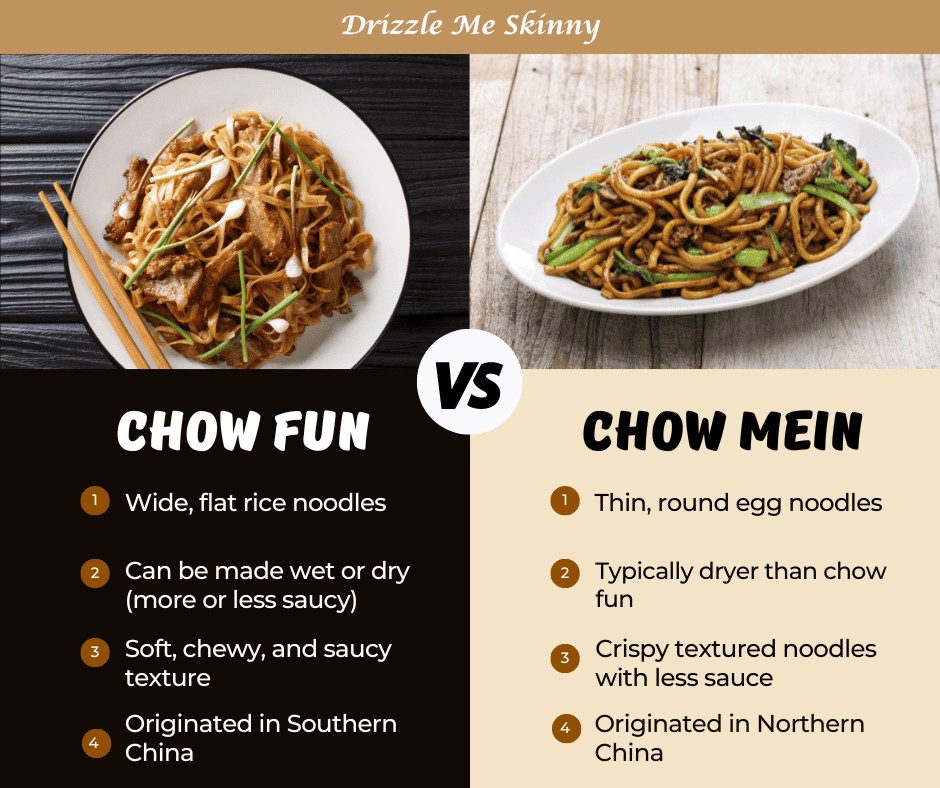What Is Chow Fun Chinese Food? It’s a delightful and authentic Cantonese noodle dish featuring stir-fried rice noodles, and at FOODS.EDU.VN, we’re dedicated to unveiling the secrets of this delectable cuisine, along with other Asian delicacies, through detailed recipes and culinary insights. Explore the rich flavors of Chinese cooking and discover how to easily create restaurant-quality chow fun at home. Unlock your cooking potential with expert tips and tricks.
1. Unveiling Chow Fun: A Cantonese Culinary Gem
Chow fun, also known as 炒粉 (chǎo fěn) in Mandarin or “Chow foon” in Cantonese, is a beloved Cantonese noodle dish celebrated for its savory flavors and satisfying texture. This popular street food and restaurant staple consists of wide rice noodles, stir-fried with a medley of ingredients such as protein (typically beef, chicken, or shrimp), vegetables, and a flavorful sauce. The dish is characterized by its slightly chewy noodles and a harmonious blend of savory, sweet, and umami notes.
1.1. Decoding the Name: The Literal Meaning of Chow Fun
The name “Chow Fun” directly translates to “fried noodles.” The term “Chow” (炒) means “stir-fried,” while “Fun” (粉) refers to noodles. This simple yet descriptive name reflects the dish’s essence: a stir-fried noodle creation.
1.2. Historical Roots: Tracing Chow Fun’s Origins
Chow fun traces its origins to Shahe, a subdistrict of Guangzhou in southern China. This historical connection is why the noodles themselves are sometimes referred to as “Shahe Fun.” From its humble beginnings, chow fun has spread globally, finding its place in Chinese restaurants and home kitchens worldwide.
2. Exploring the Diverse World of Chow Fun Variations
One of chow fun’s appealing aspects is its versatility, with numerous variations catering to diverse tastes and preferences. The most common variations are dry and wet chow fun, each offering a unique dining experience.
2.1. Dry Chow Fun: A Savory Delight
Dry chow fun is distinguished by its minimal use of sauce, resulting in a drier, more concentrated flavor profile. This variation typically features noodles, meat (often beef), and bean sprouts, without the addition of other vegetables. The noodles in dry chow fun often develop a slightly crispier texture, adding to the dish’s overall appeal.
2.2. Wet Chow Fun: A Luscious, Saucy Sensation
Wet chow fun, also known as Hong Kong-style chow fun, is characterized by its generous amount of sauce or gravy. This variation includes a wider array of vegetables, such as bok choy, onions, and mushrooms, in addition to the standard noodles, meat, and bean sprouts. The sauce in wet chow fun is typically sweeter and richer, enhancing the dish’s overall flavor.
3. Deconstructing Chow Fun: Essential Ingredients and Components
Chow fun comprises several key ingredients that contribute to its distinctive taste and texture. While variations exist, the core components remain consistent: noodles, protein, vegetables, and sauce.
3.1. Noodles: The Foundation of Chow Fun
The heart of chow fun lies in its wide, flat rice noodles, known for their slightly chewy texture. These noodles are made from rice flour and provide a satisfying mouthfeel that complements the other ingredients. Unlike chow mein noodles, chow fun noodles do not crisp up significantly during cooking.
3.2. Protein: Adding Substance and Flavor
Protein plays a crucial role in chow fun, adding substance and enhancing the dish’s overall flavor. The most popular protein choices include:
- Beef: Tender slices of beef are a classic addition, providing a rich, savory flavor that pairs well with the noodles and sauce.
- Chicken: Chicken breast or thigh meat offers a leaner alternative, with a milder flavor that allows the other ingredients to shine.
- Pork: Pork, often thinly sliced, adds a sweet and savory element to the dish.
- Shrimp: Shrimp brings a delicate seafood flavor and a slightly bouncy texture to chow fun.
- Tofu: For a vegetarian option, firm tofu can be used as a protein source, offering a neutral flavor that absorbs the surrounding flavors.
3.3. Vegetables: Enhancing Texture and Nutrition
Vegetables contribute essential nutrients, textures, and flavors to chow fun. Common vegetable additions include:
- Bean Sprouts: These crunchy sprouts add a refreshing element and a subtle nutty flavor.
- Bok Choy: This leafy green provides a slightly bitter note and a crisp texture.
- Onions: White or yellow onions add a pungent flavor and a touch of sweetness.
- Green Onions: These add a mild, fresh onion flavor and a pop of color.
- Mushrooms: Mushrooms, such as shiitake or oyster mushrooms, bring an earthy umami flavor and a meaty texture.
3.4. Sauce: The Flavorful Glue
The sauce is what brings the whole dish together. It is a mixture of soy sauce, oyster sauce, sesame oil, ginger, and pepper, as well as cornstarch and sugar that are often added to thicken and sweeten the sauce.
4. The Taste Experience: What to Expect from Chow Fun
Chow fun offers a delightful culinary experience characterized by a harmonious blend of flavors and textures. The dish boasts a savory, sweet, and umami profile, with the sauce ingredients providing depth and complexity. The rice noodles contribute a subtle rice flavor, while aromatics like garlic and ginger add a fragrant touch.
5. Mastering the Art of Chow Fun: A Step-by-Step Guide
Creating authentic chow fun at home is easier than you might think. With the right ingredients and techniques, you can whip up a restaurant-quality dish in your own kitchen.
5.1. Essential Tools: Wok and High Heat
The most important tool for making chow fun is a large wok. The wok’s curved shape and ability to distribute heat evenly are essential for achieving the desired stir-fried texture and flavor. Be sure to heat the wok until it is smoking hot before adding any ingredients.
5.2. Preparing the Noodles: Soaking for Success
If using dried rice noodles, soaking them in warm water is crucial to rehydrate them and prevent them from becoming sticky during cooking. Follow the package instructions for soaking time, typically around 20-30 minutes.
5.3. Cooking the Protein: Achieving Tenderness and Flavor
Pan-frying your chosen protein in a smoking hot wok with oil is the next step. Ensure the protein is cooked through but remains tender and juicy. Remove the protein from the wok and set aside.
5.4. Adding the Vegetables: Stir-Frying for Crisp-Tenderness
Next, add your vegetables of choice to the hot wok and stir-fry until they are crisp-tender. If using bean sprouts, add them towards the end to maintain their crunch.
5.5. Seasoning the Dish: The Sauce’s Magic Touch
Add your sauce condiments to the meat and vegetables as they continue cooking. This step infuses the ingredients with flavor and creates the signature chow fun sauce.
5.6. Combining the Elements: Stir-Frying the Noodles
Lastly, add the soaked noodles to the wok and briefly stir-fry them to coat them with the sauce and combine them with the other ingredients. Add bean sprouts at this stage, if using.
6. Chow Mein vs Chow Fun: Key Differences to Note
Chow mein and chow fun are both popular Chinese noodle dishes, but they have distinct differences in terms of noodles, sauce, texture, and origins.
6.1. Noodles: A Tale of Two Textures
Chow fun uses wide, flat rice noodles, while chow mein is made with thin, round egg noodles. Chow mein noodles tend to be crispier when cooked, while chow fun noodles remain soft and chewy.
6.2. Sauce: Wet vs Dry
Chow fun can be made wet (more sauce) or dry (less sauce), while chow mein is typically drier than chow fun.
6.3. Texture: Soft and Chewy vs Crispy
Chow fun boasts soft and chewy noodles with a more generous sauce, while chow mein features crispier noodles and a drier consistency.
6.4. Origins: North vs South
Chow mein originated in northern China, while chow fun is a southern-style Chinese dish.
| Feature | Chow Fun | Chow Mein |
|---|---|---|
| Noodles | Wide, flat rice noodles | Thin, round egg noodles |
| Sauce | Wet (more sauce) or dry (less sauce) | Typically drier |
| Texture | Soft and chewy | Crispy |
| Regional Origin | Southern China | Northern China |
7. Nutritional Considerations: Making Informed Choices
While chow fun can be a delicious and satisfying meal, it’s essential to be mindful of its nutritional content. Traditional chow fun dishes can be high in calories, carbohydrates, and sodium.
7.1. Balancing Act: Moderation is Key
Like any indulgent dish, moderation is crucial when incorporating chow fun into your diet. Be mindful of portion sizes and consider balancing it with other nutritious meals.
7.2. Healthier Swaps: Making Nutritious Choices
You can make healthier choices when preparing or ordering chow fun. Opt for lean protein sources like chicken breast or tofu, load up on vegetables, and request a lower-sodium sauce.
8. Global Popularity and Regional Adaptations
Chow fun’s popularity extends far beyond China’s borders, with regional adaptations reflecting local tastes and ingredients.
8.1. Vietnamese Influence: Hu Tieu Xao
In Vietnam, chow fun is known as “Hu Tieu Xao,” featuring similar ingredients but often incorporating local herbs and spices.
8.2. Southeast Asian Twists
Other Southeast Asian countries like Thailand and Malaysia also have their variations of stir-fried rice noodles, often incorporating unique flavors and ingredients.
9. Chow Fun for Dietary Needs: Gluten-Free and Vegetarian Options
Chow fun can be easily adapted to meet various dietary needs, including gluten-free and vegetarian diets.
9.1. Gluten-Free Delight: Naturally Gluten-Free
Since chow fun noodles are made from rice flour, they are naturally gluten-free, making it a safe and delicious option for those with gluten sensitivities or celiac disease.
9.2. Vegetarian Variations: Tofu and Vegetable Power
Vegetarian chow fun can be made by substituting tofu or a mix of vegetables for the traditional meat protein. Be sure to use a vegetarian-friendly sauce, omitting oyster sauce.
10. The Art of Customization: Tailoring Chow Fun to Your Taste
One of the best things about chow fun is its adaptability. You can easily customize the dish to suit your preferences, experimenting with different ingredients and flavors.
10.1. Protein Power: Choose Your Favorite
Feel free to swap out the traditional beef, chicken, or shrimp for your favorite protein, such as pork, tofu, or even a combination of several.
10.2. Veggie Variety: Load Up on Your Greens
Don’t hesitate to add your favorite vegetables to chow fun. Broccoli, carrots, snap peas, and bell peppers are all excellent additions.
10.3. Spice It Up: Adding Heat to Your Chow Fun
If you like a bit of heat, add a pinch of red pepper flakes or a drizzle of chili oil to your chow fun.
 Bowl of Chow Fun with beef and bean sprouts.
Bowl of Chow Fun with beef and bean sprouts.
11. Restaurant or Home-Cooked?
Chow fun is available in restaurant-style and home-cooked versions, so you can choose what best suits your lifestyle.
11.1. Restaurant-Style: Authentic and Convenient
Ordering chow fun at a restaurant offers an authentic culinary experience and convenience. Many Chinese restaurants specialize in creating flavorful and well-balanced chow fun dishes.
11.2. Home-Cooked: Personalized and Satisfying
Making chow fun at home gives you greater control over the ingredients and flavors, allowing you to personalize the dish to your preferences. Home-cooked chow fun can be a satisfying and rewarding culinary experience.
12. Pairing Suggestions: Complementing Chow Fun with Culinary Companions
To elevate your chow fun dining experience, consider pairing it with complementary dishes and beverages.
12.1. Appetizers: Setting the Stage for Flavor
Start your meal with light and refreshing appetizers like spring rolls, dumplings, or a simple cucumber salad.
12.2. Soups: Adding Warmth and Comfort
A bowl of wonton soup or egg drop soup can provide a comforting and flavorful counterpoint to the savory chow fun.
12.3. Beverages: Quenching Your Thirst
Pair chow fun with refreshing beverages like iced tea, lemonade, or a crisp lager.
13. Expert Tips: Achieving Chow Fun Perfection
To achieve chow fun perfection, keep these expert tips in mind:
- High Heat is Key: Ensure your wok is smoking hot before adding any ingredients.
- Don’t Overcrowd the Wok: Cook the ingredients in batches to prevent overcrowding and ensure even cooking.
- Use Fresh Ingredients: Fresh ingredients will always yield the best flavor.
- Taste and Adjust: Taste the sauce and adjust the seasonings to your liking.
- Serve Immediately: Chow fun is best enjoyed immediately after cooking.
14. FOODS.EDU.VN: Your Gateway to Culinary Excellence
At FOODS.EDU.VN, we are passionate about sharing our culinary knowledge and empowering you to create delicious and authentic dishes at home. Explore our website for a wealth of recipes, cooking tips, and culinary insights.
14.1. Unlock Your Culinary Potential
Discover expert techniques and step-by-step instructions that will transform you into a confident and skilled home cook.
14.2. Explore a World of Flavors
Embark on a culinary journey around the globe, exploring diverse cuisines and uncovering hidden culinary gems.
14.3. Join Our Community of Food Lovers
Connect with fellow food enthusiasts, share your culinary creations, and learn from others in our vibrant online community.
15. A Culinary Invitation: Discover More at FOODS.EDU.VN
Ready to embark on your culinary adventure? Visit FOODS.EDU.VN today and unlock a world of delicious possibilities. Whether you’re a seasoned chef or a novice cook, we have something to inspire and delight you.
15.1. Dive into Detailed Recipes
Find easy-to-follow recipes with clear instructions and helpful tips to guide you through every step of the cooking process.
15.2. Explore Culinary Insights
Delve into articles and guides that explore the history, culture, and science behind your favorite foods.
15.3. Connect with Fellow Foodies
Share your culinary creations, ask questions, and connect with a community of passionate food lovers.
16. Beyond the Recipe: Engaging with the Chow Fun Culture
To deepen your appreciation for chow fun, consider exploring the cultural context and history surrounding this beloved dish.
16.1. Exploring Culinary History
Research the origins of chow fun and its evolution over time. Understand how regional variations and cultural influences have shaped the dish we know today.
16.2. Trying Authentic Versions
Seek out authentic chow fun experiences by visiting Chinese restaurants or street food vendors known for their traditional preparations.
16.3. Sharing Your Creations
Share your homemade chow fun creations with friends and family, spreading the joy of this delicious dish.
17. Health and Wellness: Making Mindful Choices with Chow Fun
While chow fun can be a delicious and satisfying meal, it’s important to make mindful choices to support your overall health and wellness.
17.1. Balancing Ingredients
Prioritize fresh, whole ingredients like lean proteins, colorful vegetables, and whole-grain noodles.
17.2. Controlling Portion Sizes
Be mindful of portion sizes to avoid overconsumption of calories, carbohydrates, and sodium.
17.3. Adjusting Cooking Methods
Opt for healthier cooking methods like stir-frying or steaming instead of deep-frying.
18. The Future of Chow Fun: Innovations and Trends
As with any culinary tradition, chow fun is constantly evolving, with chefs and home cooks experimenting with new flavors, ingredients, and techniques.
18.1. Fusion Flavors
Explore innovative fusion variations that incorporate elements from other cuisines, creating unique and exciting flavor combinations.
18.2. Plant-Based Innovations
Discover plant-based chow fun recipes that utilize creative meat substitutes and vegetable combinations to deliver a delicious and satisfying vegetarian experience.
18.3. Sustainable Sourcing
Support sustainable sourcing practices by choosing ingredients from local and ethical producers.
19. Frequently Asked Questions (FAQs) About Chow Fun
Q1: What exactly is chow fun?
A: Chow fun is a Cantonese stir-fried noodle dish made with wide rice noodles, protein (such as beef, chicken, or shrimp), vegetables, and a savory sauce.
Q2: What does chow fun taste like?
A: Chow fun has a savory, sweet, and umami flavor profile, with the sauce ingredients providing depth and complexity. The rice noodles contribute a subtle rice flavor, while aromatics like garlic and ginger add a fragrant touch.
Q3: What are the different types of chow fun?
A: The two main types of chow fun are dry chow fun, which has less sauce, and wet chow fun (Hong Kong-style), which has a generous amount of sauce or gravy.
Q4: Is chow fun gluten-free?
A: Yes, chow fun noodles are made from rice flour, making it a naturally gluten-free dish.
Q5: Can I make vegetarian chow fun?
A: Yes, you can easily make vegetarian chow fun by substituting tofu or a mix of vegetables for the traditional meat protein.
Q6: What are the key ingredients in chow fun?
A: The key ingredients in chow fun are wide rice noodles, protein (beef, chicken, shrimp, or tofu), vegetables (bean sprouts, bok choy, onions, mushrooms), and a savory sauce.
Q7: What is the best way to cook chow fun noodles?
A: If using dried rice noodles, soak them in warm water before cooking to rehydrate them. Then, stir-fry them in a hot wok with the other ingredients until they are coated with the sauce.
Q8: What kind of sauce is used in chow fun?
A: Chow fun sauce typically includes soy sauce, oyster sauce, sesame oil, ginger, garlic, and pepper. Cornstarch and sugar may be added to thicken and sweeten the sauce.
Q9: Is chow fun healthy?
A: Traditional chow fun dishes can be high in calories, carbohydrates, and sodium. However, you can make healthier choices by opting for lean protein sources, loading up on vegetables, and requesting a lower-sodium sauce.
Q10: Where can I learn more about chow fun and other Chinese dishes?
A: Visit FOODS.EDU.VN for a wealth of recipes, cooking tips, and culinary insights.
20. Conclusion: Embrace the Flavors of Chow Fun
Chow fun is more than just a noodle dish; it’s a culinary journey that celebrates Cantonese flavors and traditions. Whether you’re enjoying it at a restaurant or creating it in your own kitchen, chow fun offers a delicious and satisfying experience that is sure to delight your senses. So, embrace the flavors of chow fun and discover the joy of Chinese cuisine. Remember to visit FOODS.EDU.VN for more culinary inspiration and resources. We are located at 1946 Campus Dr, Hyde Park, NY 12538, United States. You can reach us via Whatsapp at +1 845-452-9600 or visit our website at foods.edu.vn.

